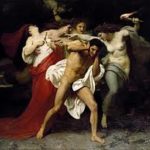Chapter 56
Notes on a Dinner Talk
An experiment with “real” corn whiskey. (p.141)
We are introduced to the difference between data and understanding.
Chapter 57
Receptivity
“G. waits until the worst possible times to transmit real data.” (p.143)
Stories of late night talks in the atrium – very hot – very crowded – very late.
Sometimes, when the mood is right, data can be transmitted that can become understanding. If that knowledge is not transmitted at the right moment during the right mood, it becomes only an element of formatory thinking. At those moments that data is lost and irretrievable. The presenter has no choice but to wait for the next moment when all the elements of receptivity are there.
What are those elements? Also, are your ears tuned to the magic of transmission? Are your ready when the ordinary is suddenly interrupted by something extraordinary?
Did you hear that pin drop?
Audio File Class #31 2017_10_18
Chapter 58
Carrying the Banner
“Three types of activities attract people to study groups: mental types will be attracted by the challenge; physical types by something addictive, like movements; emotional types will be attracted by someone to follow.” (p. 146)
“G. is looking for a few resourceful workers with self-honesty and impartiality toward their machine activities and preferences who can adapt the Work to the Time, Place, and circumstances and present the essence of the Work without distortion.” (p.147)
Chapter 59
Notes on Group Work
“The Practical exercises (‘PWOS’) provide the best preparation for work on self. Treat them with respect. Recognize they are not going to be with out their special difficulties.” (p.148)
“We must know enough to bring someone else to the Work.” (p.148)
Audio File Class #32 2017_10_25
Chapter 60
To Be Alive
“Yes, to dance beneath the diamond sky with one hand waving free” (Dylan, Mr. Tambourine Man)
In this brief chapter E.J. opens by saying:
“Thousands of hours of consciousness in order to have being; to be really alive. Participate voluntarily with presence in life… (P.150)”
We also read in the Hidden Work – chapter 8 (p.70) –
“This evolutionary effect will one day bring us to our annihilation. In a sense, to invoke often is to die before you die.”
Is consciousness worthwhile to us – the Author asks – of course we say. But, only as we taste the fruits from this fine bakery of awakening do we hunger to find our way back to the Bakery of Magical Treats.
Audio File of Class #33 2017_11_01
Chapter 61
Mr. God
In this chapter EJ tells us we suffer because of the “self-love of our inner Mr. God.” We are protecting the psyche developed as our historical personality. We can dig ourselves out.
He goes on to refer to Clark Kent – who transforms himself into Superman. But, when he becomes Superman – then he must do something. What is that something we must be doing? Can you translate that into practical work?
Audio File Class #34 2017_11_08
Chapter 62
We Need A Miracle
The Chapter opens with the maxim: “Do not trust others with responsibility beyond their means.” (p.153)… and continues with “Think of all those in need of real help, who cannot find their way by themselves.”
As apprentices in the work, we occasionally find ourselves in a position to lend a helping hand into the world of seekers. They are rare and unusual beings walking the earth. Occasionally they wind up in our path. Our touch must be light and guiding … but mostly light. We should understand our capacities – though limited – the opportunity is before us. Sometimes you must act. Act then – you must.
The next part of this chapter leads directly to the following chapter:
Chapter 63
Remorse
In the last part of Chapter 62 and in Chapter 63 E.J. gives a curious exercise concerning our mother. This is reminiscent of Chapter 14, Practical Work on Self – Remorse of Conscience. I suggest you take a look at this material. You will find it rich, practical and useful.
Audio Recording of Class #34 2017_11_15
Chapter 65
Forgetfulness
In many contexts, we always ask the question “How can I remember to do my Work?”
This chapter in the book – Work of Groups – answers the question. We will briefly explore this question by talking about Sports and the Prayer of Jesus.
This class is participative – you will asked to participate in helping us get to the answer – is that not one of the key attributes of a Group? Working together to solve a common problem.
Audio File Class #35 2017_11_29
Chapter 66
Exposure
In chapter 66 E.J. is discussing why he responds in certain ways. M responds:
“When you respond in that manner it gives us a chance to see our identifications.”G continues “… (It) allows us to see, for one part of one second, our machine as a machine.” (p.162)
A critical part of our Work on Self has to do with Self Observation. We must learn to observe our selves. The machine has been developed by us to help us survive. Alas, much of what we learned we learned from our parents and relatives – during our first 5 years or so. We have not really been able to modify those traits and behaviors.
Generally, that is not a problem. Most live out our lives in a form of quiet surrender. As T.S. Elliot said:
We are the hollow men
We are the stuffed men
Leaning together.
But, in order to release our own essential self we must start with who we are and how we behave. Self observation is generally passive and simple but there are some parts of our machine behavior that require a type of exposure.
Can you put your self in a situation, whereby you can see your self as it really is? Can you see the mechanism at work. First, if you are courageous enough to do so, you must not judge that behavior. You nod and say – “Curious – so that is how it works.”
By careful and gentle observation something might happen. Slowly, the light gets in to dark corners.







